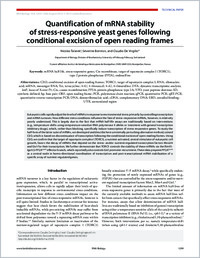Quantification of mRNA stability of stress-responsive yeast genes following conditional excision of open reading frames
- Talarek, Nicolas Department of Biology, Division of Biochemistry, University of Fribourg, Switzerland - Institut de Génétique Moléculaire de Montpellier, France
- Bontron, Séverine Department of Biology, Division of Biochemistry, University of Fribourg, Switzerland
- De Virgilio, Claudio Department of Biology, Division of Biochemistry, University of Fribourg, Switzerland
-
13.06.2013
Published in:
- RNA Biology. - 2013, vol. 10, no. 8, p. 1299–1306
English
Eukaryotic cells rapidly adjust the levels of mRNAs in response to environmental stress primarily by controlling transcription and mRNA turnover. How different stress conditions influence the fate of stress-responsive mRNAs, however, is relatively poorly understood. This is largely due to the fact that mRNA half-life assays are traditionally based on interventions (e.g., temperature-shifts using temperature-sensitive RNA polymerase II alleles or treatment with general transcription inhibitory drugs), which, rather than blocking, specifically induce transcription of stress-responsive genes. To study the half-lives of the latter suite of mRNAs, we developed and describe here a minimally perturbing alternative method, coined CEO, which is based on discontinuance of transcription following the conditional excision of open reading frames. Using CEO, we confirm that the target of rapamycin complex I (TORC1), a nutrient-activated, central stimulator of eukaryotic cell growth, favors the decay of mRNAs that depend on the stress- and/or nutrient-regulated transcription factors Msn2/4 and Gis1 for their transcription. We further demonstrate that TORC1 controls the stability of these mRNAs via the Rim15-Igo1/2-PP2ACdc55 effector branch, which reportedly also controls Gis1 promoter recruitment. These data pinpoint PP2ACdc55 as a central node in homo-directional coordination of transcription and post-transcriptional mRNA stabilization of a specific array of nutrient-regulated genes.
- Faculty
- Faculté des sciences et de médecine
- Department
- Département de Biologie
- Language
-
- English
- Classification
- Biological sciences
- License
-
License undefined
- Identifiers
-
- RERO DOC 209426
- DOI 10.4161/rna.25355
- Persistent URL
- https://folia.unifr.ch/unifr/documents/303622
Statistics
Document views: 158
File downloads:
- pdf: 134
